To write a job application email that stands out, start with a clear subject line that includes the position and where you found it. Address the hiring manager by name to personalize your message. In the opening, introduce yourself and specify the role. Briefly highlight your qualifications using bullet points for clarity. Attach your resume and ensure the email is concise and free of errors. Close with enthusiasm for the role and invite them to discuss further. By following these guidelines, you'll create an email that captures attention and increases your chances of success. There's more to explore!
Key Takeaways
- Use a clear subject line that includes the position title and where you found the job listing to grab attention.
- Personalize the greeting by addressing the hiring manager by name to show you've done your research.
- Highlight relevant qualifications in a concise manner, using bullet points for clarity and emphasis.
- Attach your resume and ensure all documents are professionally formatted and error-free.
- Close with a polite call to action, expressing enthusiasm for the role and inviting further discussion.
Introduction

When you're on the hunt for a job, your email can be your golden ticket to getting noticed by potential employers. The job application email serves as the first point of contact with hiring managers, and crafting it thoughtfully can significantly influence your chances of landing that coveted interview.
Start by using a professional email address that reflects your name, as this sets a positive tone right from the beginning.
Make sure to address the hiring manager by name; this personal touch enhances engagement and shows you've done your homework. In the subject line, format it clearly as "Your Name – Job Title," making it easy for the hiring manager to identify your email amid a crowded inbox.
Within the email body, highlight your relevant qualifications and express your interest in the role. This demonstrates not just your suitability but also your enthusiasm for the position.
Lastly, don't forget to proofread your email carefully. Typos or grammatical errors can detract from your professionalism and lower your chances of receiving a response.
A well-crafted job application email can truly set you apart in a competitive job market.
It Opens Networking Opportunities

Sending a job application email can be a powerful way to open networking opportunities. By directly reaching out to hiring managers, you're not just submitting your application; you're starting a conversation that might lead to future roles, even if this one doesn't pan out.
Personalized messages are crucial here—emails tailored to the company and its mission resonate more, making them 29% more likely to get a response.
When you express enthusiasm about the organization, it shows you're genuinely interested, which can spark informal discussions or even referrals. If you mention mutual connections in your email, it builds trust and strengthens your networking efforts. Referrals often carry significant weight in hiring decisions, so leverage any connections you have.
Don't forget the importance of a follow-up email. This simple act demonstrates proactivity and sustained interest, further encouraging networking opportunities with the hiring manager or their team.
Engaging in this way throughout the application process enhances your visibility and can significantly impact your job search process. Remember, every email is an opportunity to foster valuable relationships that might benefit you down the line.
Concise and Engaging Subject Line
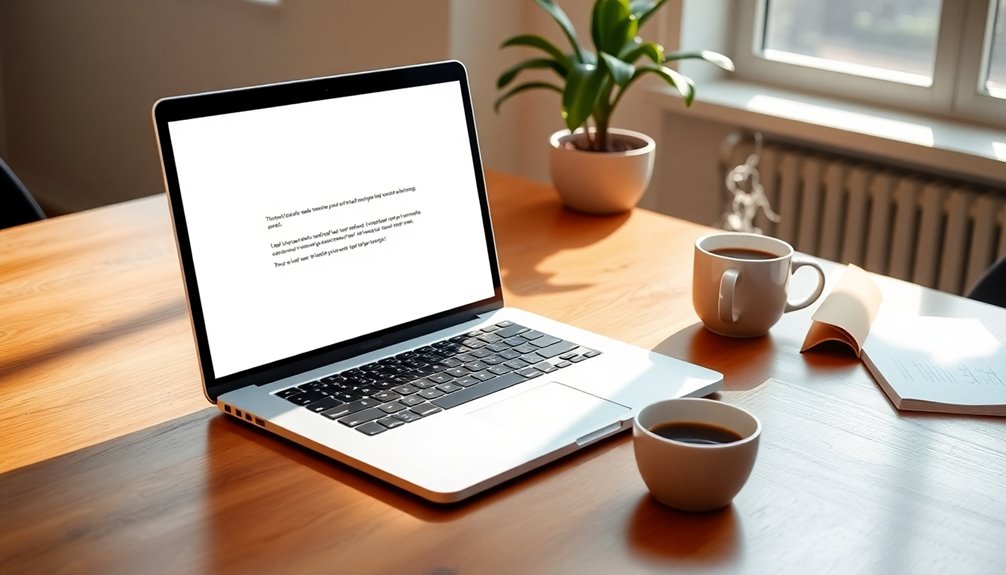
A concise and engaging subject line is crucial for grabbing a hiring manager's attention amidst a sea of applications. When you craft your email application, consider using a subject line like "Application for [Job Title] – [Your Name]." This specific format not only clarifies your intent but also boosts your chances of standing out, leading to a higher open rate.
Research shows that including the job title and your name can increase the open rate by 25% compared to vague options.
Avoid generic subject lines like "My Resume" or "Job Application," as these can easily get lost in crowded inboxes or even trigger spam filters. Keep your subject line concise—ideally under 60 characters—to ensure it displays fully on mobile devices, making it easy for potential employers to read quickly.
If applicable, consider including a reference number in your subject line. This small detail demonstrates your attention to detail and helps the hiring manager identify your application effortlessly within their system.
Step-by-Step Guide to Crafting Emails

Crafting a well-structured email is key to making a strong impression on a hiring manager. Start with a clear subject line, like "Your Name – Job Title," to ensure your email is easily identifiable.
In your opening paragraph, introduce yourself and specify the position you're applying for, along with how you found the job listing.
Next, highlight your relevant qualifications in the body of the email. Connect your skills directly to the job requirements mentioned in the posting—this shows the hiring manager that you're a good fit.
Be sure to mention any attached documents, such as your resume and cover letter, so they can easily access your application materials.
For your closing, use a professional sign-off. Express enthusiasm for the position and your eagerness to contribute to the team.
You can also offer to provide additional information if needed, reinforcing your willingness to engage further. This approach not only makes your email stand out but also demonstrates your professionalism and commitment to the opportunity.
Dos and Don'ts for Job Emails
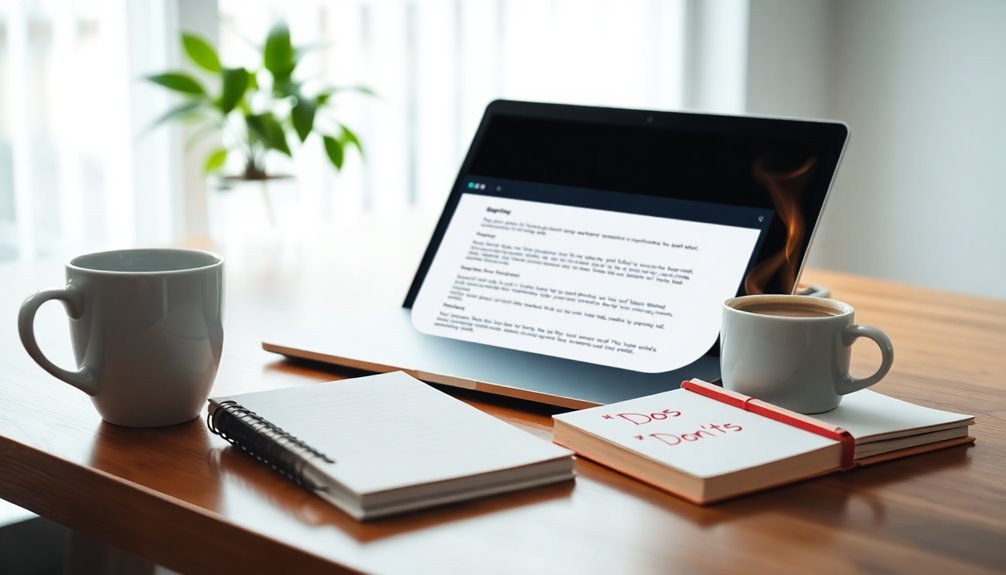
When applying for a job via email, following the right dos and don'ts can significantly impact your chances of making a great impression.
First, do personalize your email by addressing the hiring manager by name. This shows attention to detail and establishes a connection.
Next, always use a clear subject line like "Application for [Job Title] – [Your Name]." This helps ensure your email isn't lost in spam filters.
Keep your email concise. Focus on your key qualifications and experiences; lengthy emails can lose the reader's attention. Additionally, maintaining a professional tone is crucial in establishing your credibility as a candidate. Consider also your credit score, as it may be relevant to your financial health and job stability.
Don't forget to proofread your email for any typos or grammatical errors. Mistakes can undermine your professionalism and credibility.
Additionally, do attach your resume and any relevant documents, making sure to mention these attachments in the body of your email. This lets the hiring manager know what to expect.
Lastly, express your interest in the role clearly, which helps convey your enthusiasm and commitment. Doing so demonstrates your understanding of the job's requirements and the importance of clear communication in professional correspondence.
Job Application Email Instances
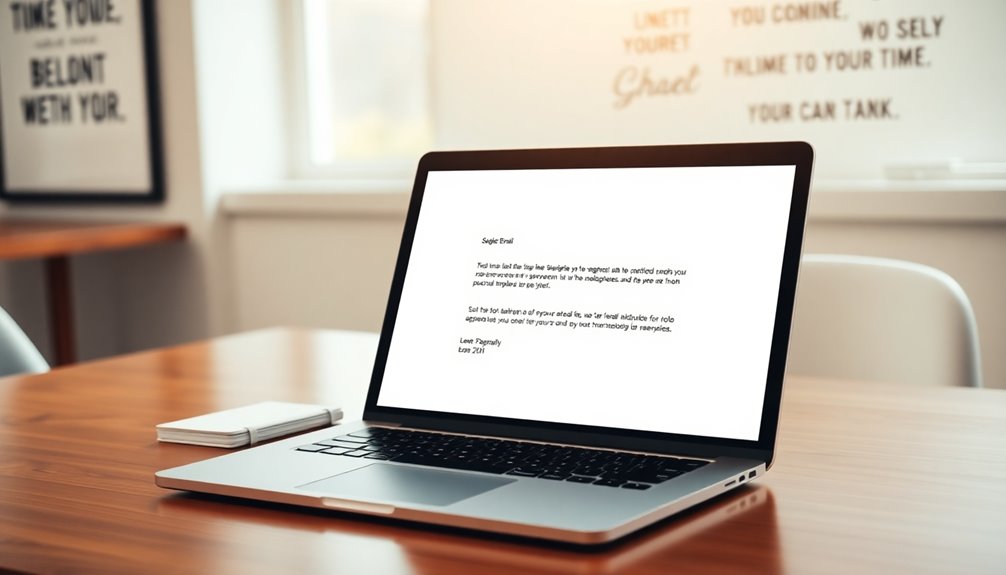
Numerous instances arise where you might need to send a job application email, making it essential to tailor your approach for each situation. For positions not listed on job boards, a well-crafted job application email can be your ticket to securing an interview.
Start with a clear subject line that states the job position you're applying for, which helps hiring managers identify your email quickly.
Use a personalized greeting to address the recipient by name, if possible, to establish a connection. In the body of your email, concisely highlight your qualifications and explain why you're a great fit for the role.
If you're including an application letter, mention it in the email and ensure your resume is attached in PDF format to preserve its formatting.
Don't forget to follow up on your job application email within one to two weeks. A follow-up email can reinforce your interest in the position and may increase your chances of getting noticed by hiring managers.
Tailoring each job application email to reflect the specific role and company will significantly improve your chances of landing that coveted interview.
Pro Tips for Writing Effective Emails
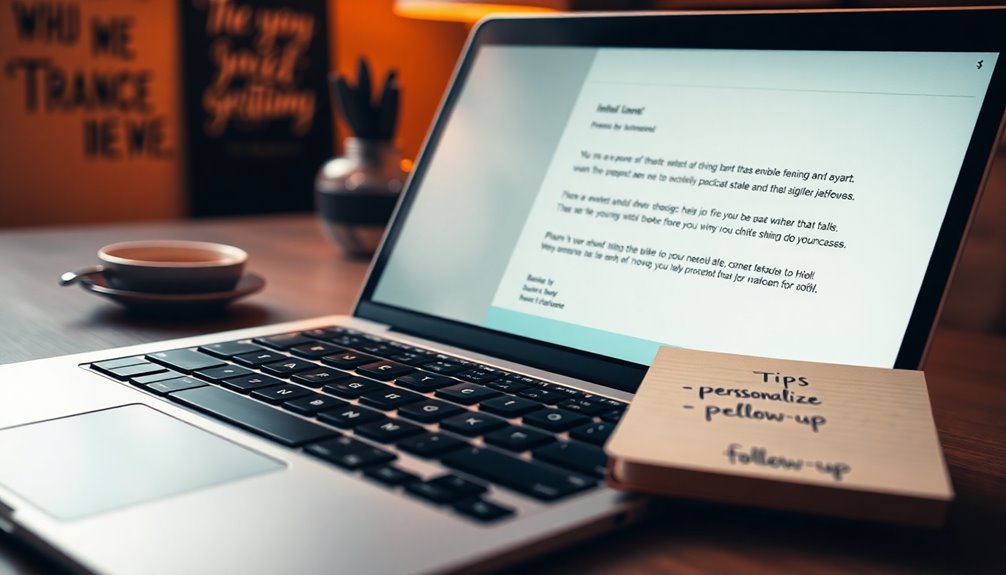
Writing an effective job application email can make a significant difference in your job search. Start with a clear subject line like "Your Name – Job Title." This helps the hiring manager easily identify your email and keeps it out of spam filters.
Begin with a professional salutation, addressing the hiring manager by name if you can. This establishes a personal connection and shows you've done your research.
In your introduction, express your interest in the position, mention where you found the job listing, and give a brief overview of your relevant qualifications.
In the body of your email, highlight your key skills and experiences that align with the job requirements. This demonstrates how you're a great fit for the role.
Be concise and focused; hiring managers appreciate clarity.
Final Thoughts
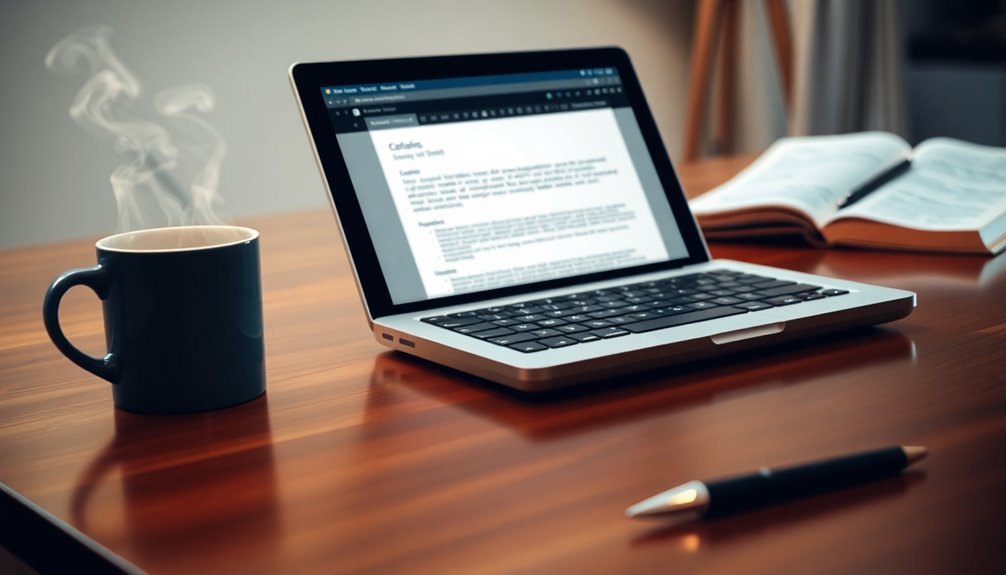
Crafting a job application email is a crucial step in your job search journey. A well-structured email with a clear subject line can significantly boost your chances of catching hiring managers' attention.
Remember, 70% of them prefer direct communication over generic applications. Highlight specific qualifications relevant to the job; this can set you apart from the 80% of applicants who never reach the interview stage.
Don't underestimate the power of a call to action—expressing your interest in discussing the role further can prompt hiring managers to engage more actively with your application.
Additionally, make sure to proofread your email carefully; 61% of recruiters dismiss candidates due to typos and grammatical errors, which could cost you a valuable interview opportunity.
Frequently Asked Questions
How Do I Write an Email Requesting a Job Interview?
To write an email requesting a job interview, start with a clear subject line that grabs attention.
Introduce yourself in the opening, expressing your interest in the position and how you found it.
In the body, highlight your qualifications and how they match the job requirements.
Politely request a meeting, showing enthusiasm for discussing your potential contributions.
End by thanking the hiring manager for their time and include your contact information for follow-up.
How to Email to Ask About the Job Application Status After Interview?
After your interview, it's important to follow up on the job application status.
Wait a week, then send a concise email. Start by thanking them for the interview opportunity, and express your enthusiasm for the position.
Mention the job title and the date of your interview for clarity.
What Is an Example of a Good Email for a Job Application?
A good job application email grabs attention right away. Start with a clear subject line like "Your Name – Job Title."
In your opening, introduce yourself and specify the job you're applying for. Highlight your relevant skills and experiences in the body, making sure they align with the job description.
Mention attached documents and express your willingness to provide more information. Conclude with a professional closing, your contact details, and a statement of enthusiasm for the position.
How Do You Write an Email to See if They Are Hiring?
To find out if a company's hiring, start with a clear subject line that specifies your inquiry.
Address the hiring manager by name, if possible, to make it personal.
Briefly introduce yourself and mention your interest in specific positions.
Express genuine enthusiasm for the company's mission and culture.









